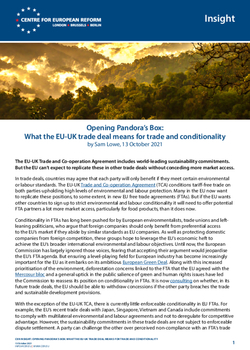
Opening Pandora's Box: What the EU-UK trade deal means for trade and conditionality
The EU-UK Trade and Co-operation Agreement includes world-leading sustainability commitments. But the EU can’t expect to replicate these in other trade deals without conceding more market access.
In trade deals, countries may agree that each party will only benefit if they meet certain environmental or labour standards. The EU-UK Trade and Co-operation Agreement (TCA) conditions tariff-free trade on both parties upholding high levels of environmental and labour protection. Many in the EU now want to replicate these positions, to some extent, in new EU free trade agreements (FTAs). But if the EU wants other countries to sign up to strict environmental and labour conditionality it will need to offer potential FTA partners a lot more market access, particularly for food products, than it does now.
Conditionality in FTAs has long been pushed for by European environmentalists, trade unions and left-leaning politicians, who argue that foreign companies should only benefit from preferential access to the EU’s market if they abide by similar standards as EU companies. As well as protecting domestic companies from foreign competition, these groups hope to leverage the EU’s economic heft to achieve the EU’s broader international environmental and labour objectives. Until now, the European Commission has largely ignored those voices, fearing that accepting their argument would jeopardise the EU’s FTA agenda. But ensuring a level-playing field for European industry has become increasingly important for the EU as it embarks on its ambitious European Green Deal. Along with this increased prioritisation of the environment, deforestation concerns linked to the FTA that the EU agreed with the Mercosur bloc and a general uptick in the public salience of green and human rights issues have led the Commission to reassess its position on conditionality in FTAs. It is now consulting on whether, in its future trade deals, the EU should be able to withdraw concessions if the other party breaches the trade and sustainable development provisions.
Ensuring a level-playing field for European industry has become increasingly important for the EU as it embarks on its ambitious European Green Deal.
With the exception of the EU-UK TCA, there is currently little enforceable conditionality in EU FTAs. For example, the EU’s recent trade deals with Japan, Singapore, Vietnam and Canada include commitments to comply with multilateral environmental and labour agreements and not to deregulate for competitive advantage. However, the sustainability commitments in these trade deals are not subject to enforceable dispute settlement. A party can challenge the other over perceived non-compliance with an FTA’s trade and sustainable development provisions – as has recently happened under the EU’s trade deal with South Korea, due to South Korea breaching the labour commitments in the FTA. Once the dispute is initiated, an expert panel may report on whether the complaint was warranted, but there are ultimately no sanctions for non-compliance.
DG Trade, the European Commission’s trade directorate, has long been sensitive to criticism that its approach to trade and sustainability lacks bite: in 2018 it published a non-paper arguing that sanctions would not improve compliance, and that it should keep its focus on improving the existing model through greater use of the existing name and shame mechanisms. DG Trade has a point. As I have written previously, other countries such as the US and Canada normally include provisions in their FTAs allowing for sanctions or reduced benefits if a party breaches an agreement’s labour and/or environment commitments. But there is little evidence to suggest that their sanctions-based approach is more effective than the EU’s: to date no formal case has been brought under the environmental provisions of any US FTA, and only one labour rights case has been subject to dispute settlement (although the recently-signed deal with Canada and Mexico (USMCA) appears to be improving labour outcomes in Mexico). But the EU’s trade negotiations with the UK undermined the Commission’s argument that sanctions linked to labour and environmental obligations are unnecessary to ensure compliance.
The EU’s desire to maintain a level playing field between EU-based and UK-based firms, and prevent the UK from engaging in competitive deregulation, led to the TCA including uniquely stringent environmental, climate change and labour conditionality, with steep penalties for non-compliance. For example, in respect of the environment and climate, the EU and UK have agreed not to “weaken or reduce, in a manner affecting trade or investment between the Parties” rules covering a number of areas, including industrial emissions, air quality, nature and biodiversity conservation, waste management and climate targets. A failure to comply with the provisions can, following review by a panel of experts, result in remedial action in the form of TCA benefits such as aviation rights being removed, and tariffs being reintroduced. These specific commitments sit alongside more general ‘rebalancing’ provisions, which also allow for TCA benefits to be suspended in the event that any future divergence in labour, social, environmental, climate, or subsidy regulation materially impacts trade or investment between the EU and UK.
The TCA is unique among trade deals, and even partially replicating its provisions in new EU FTAs will prove challenging.
The TCA has expanded policy-makers’ and public conceptions of what the EU can and should include in EU trade agreements. But the TCA is unique among trade deals, and even partially replicating its provisions in new EU FTAs will prove challenging. The TCA was born out of unique circumstances, with the UK attempting to disentangle itself from a deeply integrated economic relationship, and covers a much wider range of issues than normal FTAs. Alongside the total removal of tariffs and quotas (subject to products meeting the rules of origin requirements), the TCA also covers air and road transport, energy interconnectors, law enforcement, judicial co-operation and social security provisions. In the event of a deal not being reached, the UK would have been left trading with the EU on the flimsiest of bases, with nearly every aspect of the relationship plagued by legal uncertainty. The unique status of Northern Ireland also meant that in some instances the UK was not just attempting to avoid restrictions on trade between the EU and the UK, but within its own territory. The EU was therefore able to demand more of the UK in respect of conditionality, because the TCA mattered a lot more to the UK than an FTA normally would to a prospective EU partner. Conditionality also mattered much more to the EU in these negotiations than in other FTAs, because of the pre-existing economic linkages between the two economies, and the perception that UK deregulation posed a much bigger competitive threat.
The lesson here is that if the EU wants other countries to make binding labour and environmental commitments, it needs to ensure its trade offer is suitably enticing. Take the yet-to-be-ratified agreement with Mercosur. Here the EU has had some success in conditioning limited tariff-free access for some imported egg products on meeting EU animal welfare standards. But if the EU wants to go further, and condition preferential access to the EU market on efforts to combat deforestation, for example, it will struggle to convince its negotiating partners to agree unless it offers to remove tariffs to a much greater extent than it has done hitherto. For example, it would be difficult to convince the beef-exporting economies of Mercosur to accept greater conditionality so long as the EU offer on beef is to (eventually) reduce tariffs for only a paltry 99,000 tonnes a year (for context, around 6 million tonnes of beef and veal is estimated to be consumed in the EU every year).
The EU already accepts that countries will only agree to conditionality if they receive increased benefits in other areas of its trade policy. Under its enhanced unilateral preference scheme (GSP+), the EU offers better market access to lower income countries if they sign up to a number of international conventions on human rights, labour rights, governance and protection of the environment. The Commission has recently proposed adding the Paris Agreement to the list of conventions GSP+ beneficiaries must be party to.
If the EU pursues strict conditionality in its FTAs, it should also be aware that sometimes domestic circumstances in the prospective FTA partner mean that no offer will ever be good enough. The UK experienced this recently, when despite offering Australia close to duty-and-quota-free access to the UK market, it reportedly failed to convince Australia to include a non-binding reference to specific temperature-reduction targets in the FTA text. In such circumstances, the EU’s commitment to binding sustainability requirements will be tested, and the outcome will depend on which party most needs the trade agreement, for whatever reason, if at all.
EU policy-makers will ultimately need to decide what their priority actually is: additional protection for domestic producers, particularly in the agri-food sector; or pragmatic liberalisation that serves the EU’s international environmental goals.
Conditioning trade access on compliance with environmental, climate or labour rules can be either trade-enhancing or trade-restricting, depending on whether conditionality leads to greater liberalisation than would have otherwise been politically feasible, or serves to restrict access to the trade benefits otherwise available. EU policy-makers will ultimately need to decide what their priority actually is: additional protection for domestic producers, particularly in the agri-food sector; or pragmatic liberalisation that serves the EU’s international environmental goals. If the ultimate aim is to use conditionality to keep parts of the EU market closed off to foreign competition, rather than to ensure a level playing field for domestic producers, then the EU’s efforts will probably go nowhere, to the detriment of both its trade and sustainability agendas.
Sam Lowe is a senior research fellow at the Centre for European Reform.


Add new comment